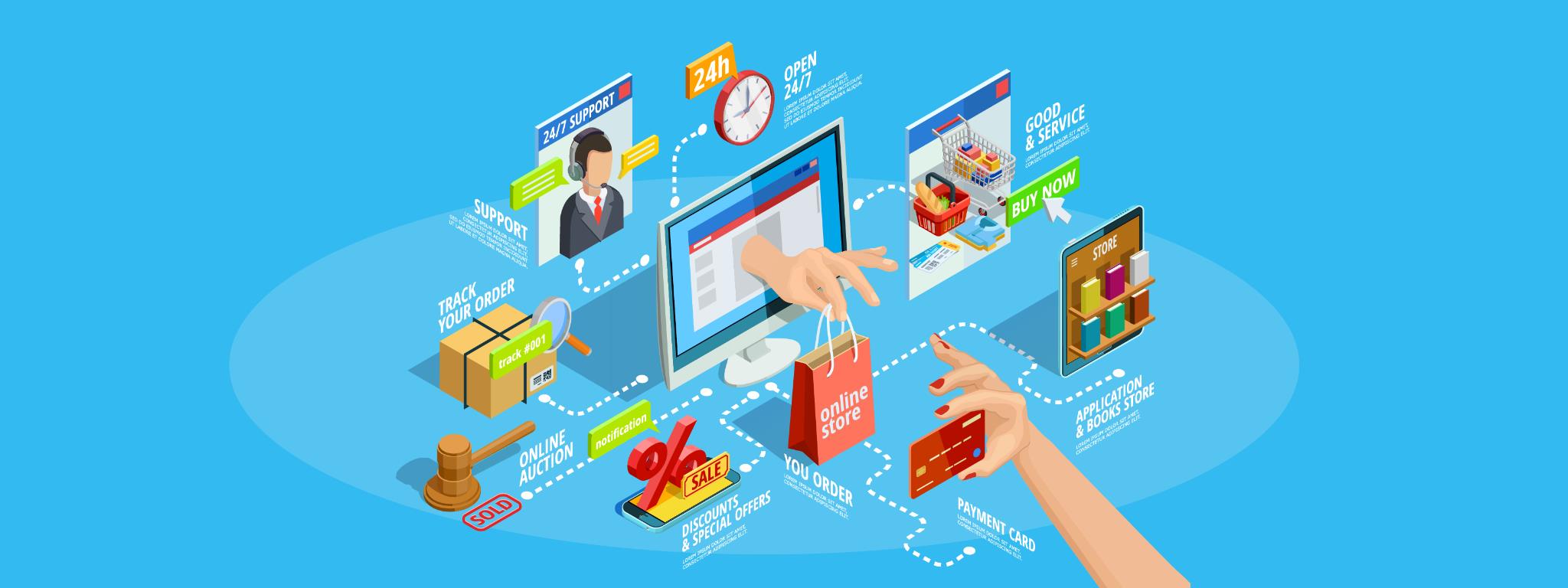The omnipresent E-commerce attracts more and more attention
on a global scale; its yearly revenue is expected to hit 10 billion by the end
of 2024. Starting an E-commerce business requires a well-outlined development
strategy and a highly functional website to maintain its performance at a high
level. However, with a growing demand from customers, it is important to create
a foundation for extension and scaling up the business.
What are the major areas of scaling make-up, and how to
handle them? Let’s follow the guide.

What Is E-commerce Scalability?
E-commerce scalability is a technical potential for the
growth and development of the E-store, accommodating it to the growing number
of customers and their needs. In technical terms, scalability is the ability of
the E-commerce website to handle ever-increasing traffic and growing customer
demands.
The scalability of an E-commerce solution is backed up by
two major forces – the proficiency of the developers who create the codebase
and the potential of servers to handle all the traffic and improvements.
Scalability, as one of the major characteristics of
E-commerce development, should be addressed right at the beginning when
communicating with the team of developers and outlining the scope of work. With
all the questions regarding the scalability and development of the E-commerce
website, contact Emerline, a
leading global provider of tech and E-commerce solutions whose developers are
ready to share knowledge and proficiency regarding the question.

The Main Scalability Challenges
1. Security and safety
Security and safety are the first to be addressed on the way
to improving the E-commerce performance. An E-commerce business is a set of
sensitive data of the customers, all the documents and data regarding business
organization and functioning, and, of course, financial matters. If there are
data breaches, the whole E-commerce enterprise will be ruined due to a lack of
trust from the customers and, sometimes, irreversible financial losses.
One of the best ways to secure the commercial environment is
to keep the security software up-to-date, keep to the simplest rules of
Internet safety, hold workshops with the employees regarding security issues,
and conduct bug bounties once in a few years.
A bug bounty is one of the most feasible ways of revealing
the data breaches in the company’s functioning with the help of so-called white
hackers. They search all the processes of the E-commerce website functioning to
try to reveal the weakest positions.
2. Inventory management
Inventory management is essential for every business
regardless of size. It allows us to keep track of all the supplies, control
over- and understocking, and determine the prices. Efficient inventory
management saves from financial losses and customer dissatisfaction, as the
stocks will always be relevant to current demand.
The inventory management can be addressed by implementing
third-party extensions, like SAP, or building the E-commerce store on platforms
like Magento, which have their native inventory management extensions. There
are a multitude of variants to use, and the most viable option will be offered
by developers' teams.
3. User experience
User experience (UX) relates to the way the customers
perceive the E-commerce store and how comfortable they feel while communicating
with the website. The team of developers is responsible for creating a seamless
operational functionality of the website with intuitive design and
functionalities. When the UX is of low quality, the users are bound to quit all
interactions with the E-store due to its prevailing negative outcome.
The UX experience is better built at the initial stage of
the E-store development. It is always possible to introduce UX changes after
the store has been launched; however, it takes time, money, and significant
disruptions to the e-store's functioning.
4. Low conversion rates
Conversion rates refer to the number of users who completed a purchase. The conversion rate is the quintessence of all the functional characteristics of the website and its smooth performance. It depends on the responsiveness of the website, speed of order fulfillment, design and functionality, efficient marketing strategy, timely deliveries, etc.
Low conversion rates signal the overall dissatisfaction of
the customers regarding the store's functioning. Therefore, it is important to
choose the right E-commerce platform (like Shopify, BigCommerce, Magento) and
hire the best-performing web development company in the USA (like Emerline), who will bring the website's tech and
visual characteristics to perfection.
5. Customer Support
Customer support sets a specific level of trust between
businesses and their customers. When the businesses fail to meet the increased
demand for customer support or are simply unresponsive, the customers will take
it a disrespectful attitude, thus looking for a more reliable option among the
competitors.
Customer support can be scaled up by introducing
AI-propelled chatbots, which help resolve simple inquiries regarding delivery
terms, order tracking, change of personal data, etc. However, more complex
requests will be addressed to human-based customer support. Such a two-way
approach will elevate the level of customer satisfaction, as there will be no
unresolved issues.
The Final Thoughts
Every E-commerce business that sets foot into a digital
environment is planning on extending its influence on a global scale. The
ability of the E-commerce solution to be improved refers to its scalability,
which targets all the spheres of the E-store functioning, such as user
experience, safety, and security, integration, customer support, conversion
rates, etc.
E-commerce scaling allows businesses to handle higher
incoming traffic without compromising the current functionality and, as a
result, generate better revenue.
If you are looking for scaling options for your business and
a proficient analysis of the current state of affairs, contact the developers’
team from Emerline to address all your suggestions and improvements and get
comprehensive insights.


